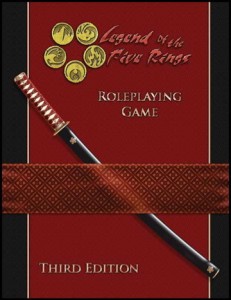 GM: Travis Lindquist
GM: Travis Lindquist
System: L5R
The Topaz championship ended and we took our names. Following that we were invited to be Sapphire Magistrates and police the Emperor’s seas. Our first mission, go stop a fleet of pirates who were attacking in the waters that crossed over by Crab and Crane territory. We tried out the mass combat system, had some skirmishes and ended chasing down the pirates to a patch of small islands we suspect they might take harbor in.
Highlights:
Isawa Shingon, when alone felt the presence of the earth Kami, heralding the arrival of none other than the Master of Earth, presumably the most powerful Earth Shugenja in existence. Isawa leapt to the ground to prostrate himself before the Master. He was told that the Master’s were proud of his display at the Championship and believed he was worthy of a powerful secret. The lost temple of the Elements, supposedly lost in time, exists. Not only does it exist, but if he true and persistent, Isawa will find it. He must, however, keep its existence secret from all, even his fellow magistrates.
Mirumoto Jo, had a vision of a Dragon and Unicorn riding towards a third armor with swords drawn. He saw the battle of the Rich Frog, but interpreted his vision wrong. He imagined the Dragon and the Unicorn allied against an unknown foe, rather than taking part in a three way battle with the Lion. Startled by this vision, Mirimoto decided then that he would take the name the fallen Moto would have taken.
Still sweating (very disgraceful) he ran to the quarters of Utaka Naya and spoke again with her ward. She said that Naya was preparing herself for her Gempuku and that Jo should be doing the same. With newfound determination he told her that he was, in fact, preparing. He then asked if she knew the name that Moto Taban would have taken at his Gempuku and he wanted to take it in honor of him. The ward told him it was a personal matter and that if wanted to honor Taban he could take his childhood name, or he could seek out Moto Taban’s ward at the funeral and ask him.
As Jo, inspired began to race to the ceremony the ward called out high and clear “The Lords of Death ride with you.” Unsure of what that meant, Mirumoto took a pony and rode out to the funeral, only to find a spectacle he could not possibly understand. Propped up as though standing was the body of Moto Taban. In front of him were several unicorn dressed all in white kimonos. The works they spoke were foreign, the practices they made of giving him possessions was bizarre and the gods they spoke to were not those of Rokugan, but from the Burning Sands. Gaijin god, the Lords of Death.
Jo observed their ceremony, saw the sacrifices they we making and heard of how they believed he would go onto another life and take the possessions burnt with him. So that he might remember the Dragon who’s steed he let ride and who defeated the Maho that murdered him, Mirimoto Jo set his katana, a work of Dragon smiths, into his Obi, to complete his Daisho. Moments later a giant blade swung over his head as Taban’s horse was beheaded, to travel with him in the afterlife. Showered in the blood of a beast, Mirumoto finally seemed accepted amongst the Unicorn who allowed them into their circle of prayer and discussion.
Believing he finally would have proved himself to the ward, Mirutmoto asked Moto Taban’s ward the name Taban would have taken, but again he was disappointed. The ward did not know. According to him, only the Lords of Death would know. And they could only be spoken to as the body burns by embracing the fire. Terrified out of his mind but consumed with the thought of finding his answer, Jo removed his Diasho both to preserve his Wakizashi and because the ward told him not to practice the no technique when embracing the fire.
Leaping onto the flame and screaming in agony as he burned, Mirimoto entered the halls of the dead. Before him three tall gaunt figured stood. He met the Lords of Death! The spoke in a chorus as though they were of one mind, each completing the sentence of the previous. They called him foreigner and told him he could ask them one question. When he inquired they told him that the first Moto had the name Al-Salin and was renamed Moto when he returned to Rokugan. Al-Salin was the name Moto Taban would have taken.
Dragged from the flames by the unicorn, Mirumoto awoke, knowing the name he would call himself. A Gaijin name at that.
During the Gempuku ceremony we had some fun reactions. Al-Salin brought less fan wavering than Kakita taking the name Shimizu, the founder of the Kakita dueling academy. Even that was trumped however, by Doji Sakura taking the name Domotai, a great daimyo of the Lion.
What rocked
All the prelude events to the ceremony were awesome (as probably evident by the detail I put into it, I loved Mirimoto’s scene with the Unicorn). The Storyteller has given nearly all of us something that makes our characters feel very special; an important role to take or goal to follow. I think having each character invested in a personal goal is going to give a huge strength to this game as we’ll always have things we want to pursue.
Near death experience. Our Isawa is made of tough stuff. Tough enough that he got hit with a Katana for 80-something points of damage and lived. I would have been dead… twice over.
What could have been improved
The actual Gempuku ceremony itself lacked the tension and excitement I was hoping for. I had prepared my Haiku in advance, spoke it and took my name with very little ceremony. Personally, as I had just had the encounter with the Unicorn I was happy not to be in the spotlight for a bit, but it seems like none of the other players particularly cared about the ceremony either, or if they did, didn’t get much of a reaction. I think that Kakita was hoping for, or expecting a bit more drama to come from his name and it was mostly received with a few fluttering fan wavers but no actual fallout. Some of the other players were scraping names out of the book at the last minute and nobody else actually read a haiku. When the notable NPCs took their names the Storyteller made a show of how the audience reacted but in the end all that happened was one player felt his character had been unfairly associated with some plot against his own clan (or at least a member of his own plan). I don’t think this was exciting for him, I think it was a WTF moment. The other NPC, Doji Sakura, took the name Domotai and while the NPCs all reacted none of the players really appreciated the significance. The whole thing seemed to fall flat, mostly in my opinion out of a lack of player interest, but some because we didn’t have sufficient hooks to the other relevant events.
Recruitment into the Sapphire Magistrates felt awkward and forced. In the case of the Yoritomo he had already forged a connection with the Sapphire Champion, had impressed him and wanted to work under him, so that character had total buy in. The rest of us however were like high school, maybe college students who got pressured by an army recruiter the day of graduation. As players we knew that we were going to be playing Sapphire magistrates, but as characters I felt our motivation was lacking. We all said yes, but there wasn’t much excitement or tension in the scene. Not really sure what could have been done about this except to plant the seeds of the Sapphire magistrates in more of us earlier on, so that a good portion of us would want to be magistrates and the others would want to be with us. Or we could have recognize each other as exceptional and ask the champion to invite another on our behalf. Like the Gempuku this probably won’t happen again, so no point in trying to work out how to do it better next time.
The naval battle was confusing for me because it totally went again my concept of task/intent/consequences. My preferred way to resolve things is using a very “Burning Wheel” method. State your intent: What final result you want. State your task: How you’re going to do it. The GM tells you the difficulty and tells you the consequences for failure. After all of that is sorted out, you roll and play it from there. In the mass combat system intent is meaningless, as is task. You have three choices “disengaged, engaged and heavily engaged” which presumably factors into your intent (for example: I want a battle with the general so I’m going to dive in and be heavily engaged or I’m going to give support to my other boats so I’ll stay disengaged, etc). The system though, is a total drop of die to see what happens. Yes, different levels of engagement should affect the results but it seemed haphazard and not at all story driven, similar to a random encounter table in 2nd edition. Also, there is a macro “Tides of War” mechanic that I thought would be cool (similar to the Burning Empires disposition) but it didn’t seem to have much there. Roll the dice, compare the totals and go “hmmm… looks like things are in your favor”. I’d need to read it again, but overall I think the system lacks the ability for players to engage it and drive it. They can choose how they act in a general sense but that doesn’t seem deterministic at all of the final outcome. I’m really not sure how this should be changed or even if it should be changed at all. If the other players had fun, I’m certainly not opposed to “roll the die and see what you get” flavor of combat as long as it doesn’t become the deciding factor in our character’s goals.
Glory and honor rewards. I just need to look these up to know what means something and what doesn’t. It seemed from our actions during the Topaz championship that more honor should have been gained or lost, but I think maybe I’m just not familiar enough with the system. Way to rectify this is just for me to read the book more.
I’m not sure what the player’s expectations of the Topaz Champion are. There were several cases where the other characters were deferring to Mirumoto because he was the Topaz Champion. I’m fine with this if players don’t mind me running the show but I think in general players don’t want to have anyone else (PC or NPC) telling them what to do. We play RPGs to try new things and have choices we wouldn’t normally have, not to be constrained. That said, if everyone else is comfortable with it, I can play Mirumoto as a leader, he’ll just be a very idealistic one. Otherwise I’ll take the role that we usually see in leadership roles, that one person is called the boss, but generally assigns people to cover their respective areas. I just need to talk to the other players at the beginning of the next game to sort that out.
An uncertainly about what this game is going to be about. We’re all playing very honorable adolescents who have just been given great power. Now, while it would be totally reasonable for us to go screw off and be young hot shots, I don’t think that will support a long running game. We won’t grow to be people of importance be being dishonorable dogs. So, our first encounter sticks us in the situation of dealing with pirates, base curs themselves. While that was fine when we were firing arrows on them or cutting down their boats, once one is captured all of us our out of our elements. Maybe that is a good thing. We learn through experience that the world is not the honorable ideals that we’ve been exposed to in the dojo. Or maybe it is going to put our characters into the situation of having no ability to navigate murky waters and falling in over and over until we either start acting like the pirates we hunt or somehow divorce ourselves from the baser requirements of our station. The specific example is having a prisoner. He has information we want, i.e. where are the other pirates. He’s not going to willingly tell us. At this point we’re at an impasse. Samurai (most Samurai) don’t torture people or use deceit to trick them out of information. If we had a Kuni with us the first would be possible, A Scorpion or Imperial could do the second, but our characters not only don’t have the skill but don’t have the stomach for that sort of dishonorable behavior. So, our only option is really to either kill him or hand him off to a local magistrate to keep him in custody. Either one of those is fine, but it seems unlikely that either will advance our story, so it just becomes and encumbrance to the game. As for solutions, I don’t know because I’m not sure yet what the flavor of the game will be. If this is a common scenario where the way to get what we want is to use a method that is unbecoming of a Samurai then I’m cool with focusing on that struggle (between the easy path and the right path) but I will probably buy off the “idealistic” disadvantage as soon as possible because I want that choice to be a meaningful one and if I really don’t ever have a choice because of the disadvantage it isn’t meaningful. We’ll see how this goes as we keep playing. I’m not 100% sure where I’m at with this yet.

